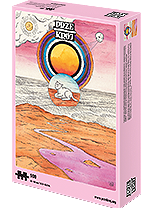
Ayurveda teaches us to observe our bodies and harmonize them with nature. Ayurvedic therapist Patrycja Sadowska explains how to practice this ancient healing system today, far from its native India.
Maria Hawranek: I have read that there are three types of doshas, our constitutions, and each one of them is a combination of two of the five elements: fire, air, ether, earth, and water. What does this all mean?
Patrycja Sadowska: When I read about it for the first time, it seemed abstract and confusing. Elements? In my body? Like some other Ayurvedic therapists, instead of doshas, I use the term managers. We think of our body as a very complex organic machine, inhabited by our soul. Do you know what your liver is doing right now?
I have no idea.
Precisely. We say that many processes in our bodies happen without us being aware of them. You know that your heart is beating, but you cannot control it. Ayurveda says that it is controlled by three doshas, three managers of the Body Corporation: vata, pitta, and kapha. Like in any other company, one of them is usually more outspoken and controlling, while the others are quiet, but their work remains essential—each one is responsible for their own department. Our constitution tells us which one of them is likely to show off in our body, speech and psyche. It is not always one manager who is in charge; often there are two leaders. That is why Ayurveda recognizes seven constitutions—three single ones, three mixed, and a balanced one, with the three doshas equally powerful.
What determines our constitution?
Out parents’ constitutions, the mother’s and father’s doshas, and the course of the pregnancy. This is the natural dosha—prakriti. Imagine that your parents give you a car or a truck, which you will use for the rest of your life. This is why in India the constitution is determined at birth—the doctor takes a look at the baby, immediately knows that they are, for example, a vata, and then hands the parents a guide with a list of products and activities that will be good for their child. Then the prakriti can remain balanced for their whole life. But if you are not aware of your natural constitution, you can develop habits that are detrimental for it. Let’s say you are a vata, but your parents give you fresh vegetables for breakfast. You won’t be able to digest them. If the natural constitution is not balanced, vikriti, an acquired constitution arises. Getting back to the vehicle analogy—imagine you had a regular-sized car but you didn’t know about it and decided to use it to transport huge IKEA boxes. There are ropes and clip hooks hanging all around, but you manage. It can last a while, but is








